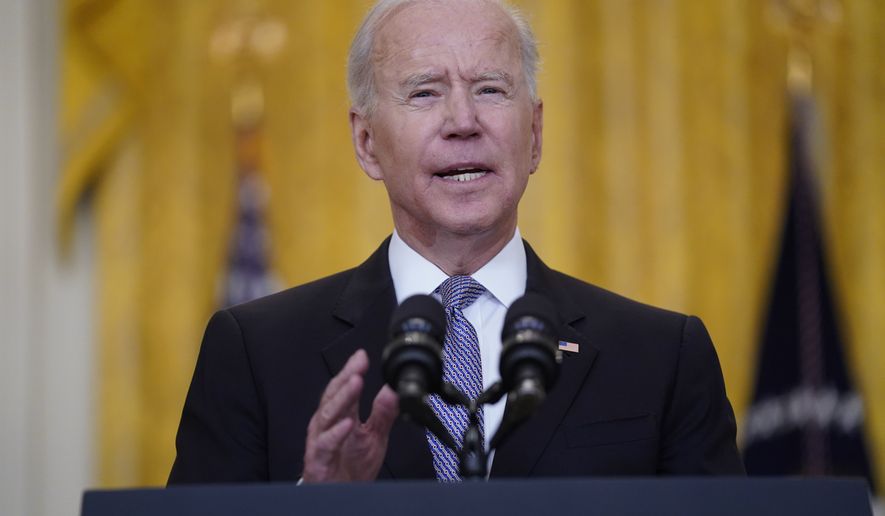The White House has deployed a two-pronged attack to push its more than $2.25 trillion infrastructure plan through Congress: publicly negotiating with Republicans on a bipartisan deal and privately courting swing-vote Democrats in the Senate who would be needed to pass a strictly partisan bill.
In the end, President Biden could use both options: passing a smaller, targeted infrastructure bill with bipartisan support and ramming through with only Democratic votes a sweeping spending package for climate change and social programs.
“This would theoretically be the best of both worlds,” said a moderate Democratic lawmaker who asked not to be identified in order to speak about legislative strategy. “The president could go to the hustings next year and talk about bipartisanship while simultaneously hitting Republicans for forcing him to move the bold parts of his agenda alone.”
The strategy is pragmatic and political. Mr. Biden campaigned for the White House last year on a pledge to restore bipartisanship in Washington. At the moment, infrastructure presents the best opportunity to keep his promise.
Building roads, bridges and railroads have long been popular because of the broad impact and tangible benefits, which also give lawmakers bragging rights in their districts and states.
“Let’s see if we can get an agreement to kick-start this and then fight over what’s left,” Mr. Biden said recently. “We’ll see if I can get it done without Republicans if need be.”
Politics also bleeds into practicality as Mr. Biden’s party only narrowly controls Congress. The Senate is split 50-50 between the parties, with Democrats claiming the majority because of the tiebreaking vote of Vice President Kamala Harris.
That leaves Mr. Biden with two options to pass an infrastructure plan: Either garner the support of at least 10 Republican senators to overcome a filibuster or use a process known as reconciliation, allowing spending bills to pass with a simple Senate majority of 51 votes.
Both routes are risky. Mr. Biden would need to water down his infrastructure package, which includes climate change programs and social welfare spending, to garner Republican support.
Even then, it is unclear whether the gambit would work. Republicans, who already have compromised on their initial price tag, refuse to support any package that does not focus exclusively on repairing the nation’s roads and bridges. Republicans also say raising corporate and income taxes to pay for the package, as Mr. Biden has proposed, is a nonstarter.
However, abandoning the more ambitious social welfare and climate change initiatives would outrage the liberal base and divide Democrats.
“We can’t wait for Republicans to deliver,” said Rep. Pramila Jayapal, Washington Democrat and chairwoman of the Congressional Progressive Caucus. “The best solution is still to go with one bill and get everything done.”
A bipartisan compromise could further undercut the electoral viability of Democrats, who are expected to fare poorly in the first midterm election of Mr. Biden’s presidency.
“The most important thing to sustain a Democratic majority is to get big things done whether it includes members of the minority party or not,” said Democratic Party strategist Colin Strother. “This administration and the [Democratic] congressional majority need to push a bold and ambitious agenda and go out and win the argument.”
The reconciliation route, however, is fraught with danger. Moderate Democrats, including Sens. Joe Manchin III of West Virginia and Kyrsten Sinema of Arizona, would play an outsize role in the process.
So far, neither senator is willing to embrace a big-spending infrastructure proposal crammed with liberal priorities, including $12 billion to provide job training for felons and $213 billion for public housing.
Mr. Manchin has called for a targeted infrastructure package along the lines of what Republicans have proposed. The West Virginia Democrat, though, has not drawn any “red lines” and instead has chosen to let the process play out.
The White House is taking a similar approach. Mr. Biden met with a negotiating team of Republican senators in search of common ground. Behind the scenes, meanwhile, he is aggressively courting Mr. Manchin and Ms. Sinema.
The White House is “fishing” for a solution on how to move forward, said a source with knowledge of the infrastructure talks.
“The votes aren’t there right now for either reconciliation or a bipartisan plan that can get 60 votes,” the source said. “This all takes time, but obviously you don’t want to rule out any options.”
Mr. Manchin is considered the most likely to flip and has been the most substantial target of the White House’s overtures. Last month, Mr. Biden appointed the senator’s wife to a $160,000-per-year job with the Appalachian Regional Commission.
Last week, the White House dispatched first lady Jill Biden and actress Jennifer Garner to West Virginia to join Mr. Manchin at an event promoting COVID-19 vaccinations. On Monday, Mr. Manchin toured a local VA medical center with Veterans Affairs Secretary Denis McDonough.
Getting Mr. Manchin on board with reconciliation does not mean the White House would discard bipartisan talks. The president could use the threat of unilateral action to secure more favorable terms and greater support from Republicans.
• Haris Alic can be reached at halic@washingtontimes.com.




Please read our comment policy before commenting.